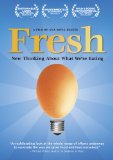| Reviews & Columns |
|
Reviews DVD TV on DVD Blu-ray 4K UHD International DVDs In Theaters Reviews by Studio Video Games Features Collector Series DVDs Easter Egg Database Interviews DVD Talk Radio Feature Articles Columns Anime Talk DVD Savant Horror DVDs The M.O.D. Squad Art House HD Talk Silent DVD
|
DVD Talk Forum |
|
|
| Resources |
|
DVD Price Search Customer Service #'s RCE Info Links |
|
Columns
|
|
|
Fresh
The 2009 documentary Fresh supplies yet another opportunity to take a long hard look at the food we eat, and the ever-more byzantine ways that it gets from farm to table.
The industrialized, government-subsidized, pesticide-controlled and often inhumane methods that today's American farmers operate under has already been given ample treatment in films like the Oscar-nominated Food, Inc. (2008) and the eccentric King Corn (2007). With Fresh, director Ana Sofia Joanes addresses the problem with a more optimistic spin. While spending a fair amount of time on the depressingly non-diverse, mechanized and unhealthy agriculture dominating the U.S. farmscape, mostly the film focuses on enterprising people who are able to thrive and provide sustainable solutions in this new Organic Farming movement.
The film's first business is taking a look at what a typical family farm is like. The chicken-producing facility operated by one Mr. and Mrs. Fox is shown with newly hatched chicks being dropped (literally) from large plastic crates into the huge, sunless and dirt-floored facility where they will eventually grow into the packaged breasts and thighs populating the average supermarket frozen aisle. The Foxes, who spend much of their screen time in a "what have we gotten ourselves into" glaze, dryly explain the conveniences of this streamlined farming operation and its benefits over the old methods. As the sole dissenting voices in the film, director Joanes is clearly showing her bias here (she also seems oddly fixated on the Foxes' pet poodle). Although this way of farming has served the Foxes well, there are better ways of doing it - methods that produce healthier food (yes!) and require less maintenance than what most experts originally estimated.
As a contrast, we then take a tour of the determinedly old-fashioned organic farm operated by Joel Salatin (who was also featured in Food, Inc.). In Salatin's operation, chickens are trucked out to a bucolic grassy field to forage while assistants collect the eggs they laid. Salatin's method is to encourage behavior that would normally occur if the animals were living in a natural setting without humans around. Getting to "the chicken-ness of the chicken" and allowing the plant and animal ecosystems to intermingle results in happier animals, a less labor-intensive environment for the farmers, and better-tasting produce and meats. Unlike at the Fox farm, the Salatin farm produces a variety of vegetables, chickens are raised for eggs and meat, and cows are similarly brought out on foraging trips for exercise and sustenance.
Salatin's farm serves as a model for what agriculture could be, and how it can thrive despite the America's farmland being given over to massive factory-farms that treat food as just another commodity to be produced in more abundant (not to mention more disease-ridden) ways. An example of someone who has seen both sides of the coin is presented in natural hog farmer Russ Kremer. The Midwestern Kremer explains how he underwent the same thing that many people from farming families of his generation did - go off to college, learn the "better" way of farming, convert to industrialization. This method worked fine for awhile, but then his pigs became so infected with constantly-mutating strains of bacteria that he wound up spending inordinate amounts of time treating their sickness. He finally decided to slaughter the entire passel, starting over with a new group of pigs that are fed on nature-based material, bred cage-free and with their tails intact (industrialized farms lop off the tails to prevent aggression). The film also spends a good amount of time consulting with experts like author Michael Pollan (another Food, Inc. interviewee), as they caution against the dangerous and unhealthy conditions that this new wave of megafarming can prompt. The older way is more sustainable, sure, but can it produce an amount of food comparable to the big guys? While it argues somewhat for the average American diet to be curbed towards quality over quantity, the film suggests that, in the end, organic farming also wins out in the production argument.
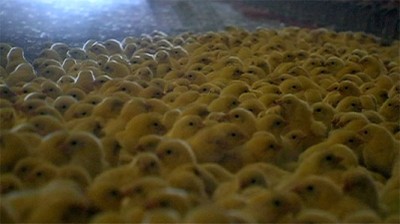
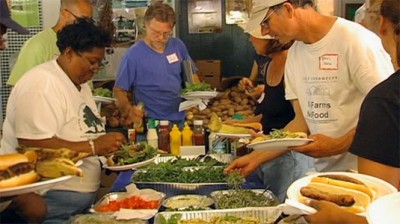
While a good portion of Fresh focuses on farming itself, it also gets acquainted with people who have been able to successfully bring the results of organic farming to people who would otherwise not be aware of the value of good food. One such person is Will Allen, the charismatic CEO of Milwaukee-based collective farming group Growing Power. We see Allen as he shepherds groups of people into the Growing Power farms, educating them on the value of worms, composting and aquaponics. There is a bit of showmanship at play here as Allen, an ex-pro basketball player and corporate salesman, gleefully demonstrating the ins and outs of his enterprise as a sort of Natural Food Disneyland. From the footage of people enjoying a hearty meal at the compound, it appears that his message is working. In a less satisfying segment, the film spends time with David Ball, a grocery entrepreneur who works with local farmers to run a chain of natural food markets. Although the segment drags along aimlessly, it does demonstrate that local-based businesses can carve a niche opposite the bland Wal-Marts of the world.
Fresh is a decent, easy-going watch with a lot of good info on organic farmers who are bucking the government-subsidized industrialized agriculture system so prevalent across the U.S. Unlike the more in-your-face Food Inc., it likely won't convert anyone who isn't already into organic foods and sustainable living. Director Salatin gets a lot of interesting points across, mostly due to the colorful nature of the people featured (with the exception of the agitated Mr. and Mrs. Fox). Her filmmaking technique, long on shots of grazing chickens and cattle, is too passive to truly engage the viewer, however. Culinarily speaking, Fresh needs more spice to be considered a totally fulfilling meal.
The DVD:
Video:
Docurama Films' DVD of Fresh showcases the film in a good 16x9 image enhanced for widescreen televisions. The film's grainy, rather unexceptional photography is given a good DVD transfer some (not too noticeable) aliasing.
Audio:
A single English-language stereo soundtrack is provided with optional subtitles. Nothing too showy here, with clear dialogue throughout.
Extras:
Just a trailer and a link to the film's official website.
Final Thoughts:
Fresh serves as a straightforward, too-brief but worthwhile look at the organic farming movement. Those who enjoyed Food, Inc. will find a few more nuggets to chew on here. Much of the info feels second-hand, however, and the skimpy DVD presentation of this already padded-out feature make it a clear case of something to try, not buy. Rent it.
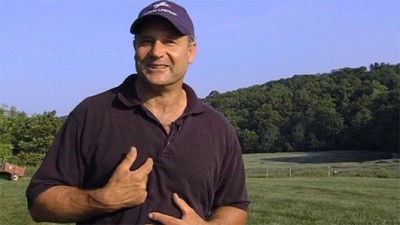
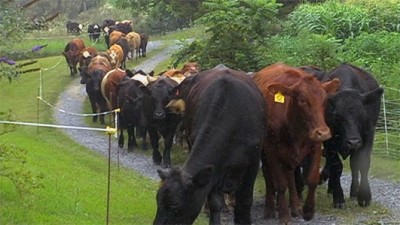
Matt Hinrichs is a designer, artist, film critic and jack-of-all-trades in Phoenix, Arizona. Since 2000, he has been blogging at Scrubbles.net. 4 Color Cowboy is his repository of Western-kitsch imagery, while other films he's experienced are logged at Letterboxd. He also welcomes friends on Twitter @4colorcowboy.
|
| Popular Reviews |
| Sponsored Links |
|
|
| Sponsored Links |
|
|
| Release List | Reviews | Shop | Newsletter | Forum | DVD Giveaways | Blu-Ray | Advertise |
|
Copyright 2024 DVDTalk.com All Rights Reserved. Legal Info, Privacy Policy, Terms of Use,
Manage Preferences,
Your Privacy Choices | |||||||









